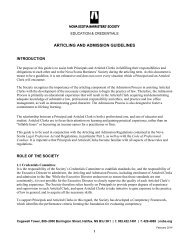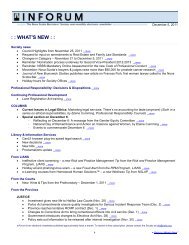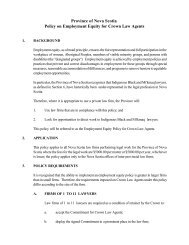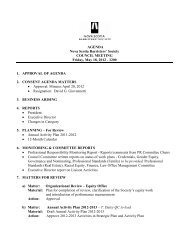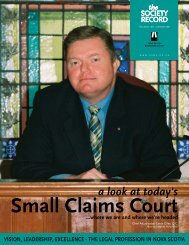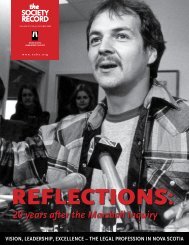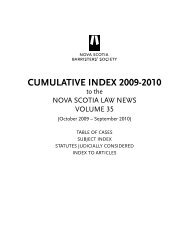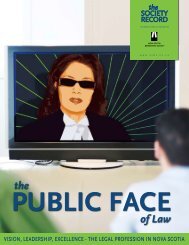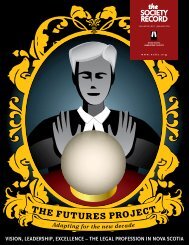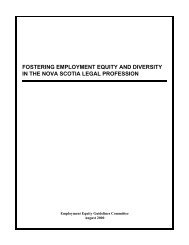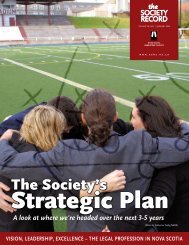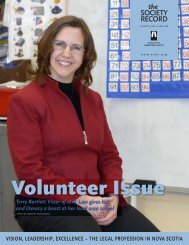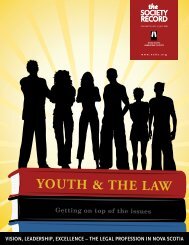The Lay of the LandThree lawyers from across the countyreport in on the state of automobile insurance in their home provinces.Ches CrosbieChes Crosbie Barristers, St. John’s, NewfoundlandLawyers are governed by a code of professional conductand by rules of court which require that fees shall befair and reasonable. But the business world operatesunder no comparable restraint. There are no excessive profits,and corporate profits are never high enough. So it is with theinsurance world.In the insurance world, the drive for unlimited profit expressesitself through the ideology that claims are out of control.<strong>No</strong>t only has the public grown more “claims conscious”,but juries have been affected by the virus, with the resultthat judgments are being rendered for larger and largeramounts. The number of awards in automobile accidentcases, personal accident actions and public liability cases hasalso steadily increased.This familiar refrain has a contemporary ring, but it comes from thecover of Canadian Insurance, February 28, 1939!<strong>No</strong>t so long ago, tort law suffered many infirmities. In a speechreprinted in the <strong>No</strong>vember 2003 edition of the Newsletter of theAtlantic Provinces Trial Lawyers Association, the Honourable R. RoyMcMurtry, Chief Justice of Ontario, recalled that when he was calledto the bar:…tort law was in bad shape. There were many rules andeconomic factors that made it very difficult for injuredpeople to succeed in litigation. Tort law also often favoreddefendants. For example, there was a guest passenger lawthat denied all recovery to gratuitous passengers againsttheir drivers. There was no compulsory auto insurance law.Damage awards were generally puny and there were manyimmunities. It was very difficult to get expert witnesses inmedical malpractice cases and harder to succeed. Limitationperiods were short and strictly enforced.In the last quarter of the twentieth century, a tort renewal occurred,and this renewal duly provoked a strong backlash from the insuranceindustry and a legislative attack on claimants’ rights. In AtlanticCanada, the attack peaked in the last five years.Many tort lawyers in other Atlantic Provinces look enviously atcomparatively modest infringements of auto injury claimant rightsimposed by the Newfoundland legislature in 2004. The chief of theserestrictions is a $2,500 deductible on all pain and suffering claims, lostwages recovered 100 per cent of net, collateral source compensationdeducted from the recovery, and minimum reduction of damages by25 per cent for failure to wear a seatbelt.Beginning in 2001, the insurance industry launched three successivecampaigns for auto tort rights restriction in Newfoundland. Thefirst two campaigns gained proponents among politicians, butfailed for lack of public support. The third campaign resulted in therestrictions above. The reason for these insurance industry failuresin Newfoundland was not that Newfoundland politicians weremore receptive to rights-based arguments or backroom lobbyingthan politicians elsewhere. The reason was that an effective coalitionagainst no-fault, composed of numerous organizations, includingAPTLA, waged successful campaigns for public support to preservetort rights, and the politicians smelled which way the votes lay. Thecoalition’s success in defending the civil justice system by shapingpublic opinion is illustrated in the conclusion of an editorial from theSt. John’s Telegram, Saturday, April 10, 2004:The only real way to cut insurance costs is to reduceaccidents. And we forget that at our peril.For the insurance industry, all awards are too high, and all access to20 The <strong>Society</strong> Record
justice is too much. Canadian constitutionalism may yet provideprotection against these ambitions by invalidating some legislativeassaults on civil justice. But where the winds of public opinion blow,politicians will follow. As Thomas Payne once said, no man’s life orproperty is safe when the legislature is in session. Civil justice is abouttruth, and organized voters armed with the truth about civil justiceare the surest bulwark against oppression.taskforce of the Canadian Bar Association and ACTLA was successfulin persuading government that no-fault insurance was not a solutionwhich Albertans would embrace at the polls. Calls for reform wouldbe largely dormant for the rest of the decade.The cyclical nature of the insurance industry was well-described byProfessor Mark Rahdert as follows:Because certain monopolistic pricing practices are legallypermitted in the insurance industry, it responds to changes inthe business cycle in a unique fashion. When times are good,insurers compete intensely with one another for market share,attempting to attract the maximum number of premiumdollars to invest for those high returns. This competition drivespremium prices down, sometimes to artificially low levels,which insurers rationalize with the prospect of handsomeoffsetting investment returns. When, however, the economyturns sour and return on investment plummets, insurers thatmay have deliberately under-priced their product duringboom times fall back on their ability to engage in legalizedprice collusion, raise insurance premium rates sharply, andthus attempt to restore profitability. During these bad timesthe insurers always find it convenient to blame, not their ownprevious investments or marketing strategy, but the courts andtort doctrine, for the need to raise premiums.Mark C. Rahdert, “Covering Accident Costs: Insurance,Liability, and Tort Reform”, 1995Gary J. Bigg, LLBFounding Secretary, Past President and Honourary LifetimeMember of The Alberta Civil Trial Lawyers AssociationUntil the 21 st century, the process of legislative reform in thelaw of automobile insurance in Alberta was relatively inactive.Wedged between provinces with public automobile insurancecarriers, Alberta had, in 2003, in excess of 125 private property andcasualty insurers, all but three of which were foreign-based. Accordingto Insurance Bureau of Canada figures, for that year, the property andcasualty industry in Alberta had 10,622 employees, and $3.7 billion ofinvested assets.In contrast, on the plaintiff’s side of the personal injury bar, the AlbertaCivil Trial Lawyers Association was inaugurated in the mid-1980s,modelled on the Trial Lawyers Association of British Columbia. Thestated mission of TLABC and ACTLA was to further educate themembership on trial practice, and foster the science of jurisprudence.By 2003, ACTLA’s 600 members had become well-equipped to aidAlberta citizens in accessing adequate compensation.On the defence side, the defence bar was well-served by ongoingcontinuing legal education from the provincial branch of theCanadian Bar Association. Indeed, in the early 1990s, when no-faultinsurance was being advocated by the insurance industry, a jointPressure on premiums in the early 21 st century lead the global privateinsurance industry to increase premiums in those markets in Canadain which they were able to do so without government regulation. Byselectively raising premiums on certain categories of drivers, notablythe young, political pressure was brought to bear on legislators toaddress the need for reform.When the incumbent government in New Brunswick narrowly escapedlosing office on the issue of auto insurance premiums, the AlbertaGovernment went into action. Unlike the Public Royal Commission(the “Osborne Report”) which pre-dated the advent of no-faultinsurance in Ontario in the early 1990s, the Alberta Governmentmet behind closed doors in caucus to decide on a package of reforms.They then established an Implementation Committee, which did notcontain representation from victim’s rights groups, or the plaintiff’sBar. The Implementation Committee met with various stakeholdergroups to fine-tune the policies, the results of which were confidential.After being voted down by a Standing Committee of the Legislature, apackage of revised reforms was presented to the Alberta Legislature inthe fall of 2003, and passed without widespread public debate.In legislation affecting all motor vehicle collisions after January 26,2004, any claims for income loss would henceforth be net of incometax. Collateral benefits and other subrogated losses, with certainstatutory exceptions (such as workers’ compensation benefits) wouldhenceforth be deducted from awards for lost income and cost of care.In more comprehensive changes effective <strong>October</strong> 1, 2004, “minorinjuries” as defined by regulation, would have non-pecuniary damagescapped at a maximum of $4,000. Associated pecuniary losses wouldstill be recoverable, with full access to the courts to recover those losses.<strong>October</strong> <strong>2006</strong> 21



